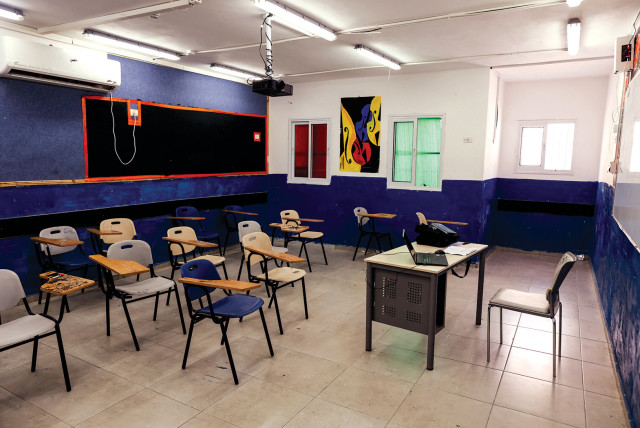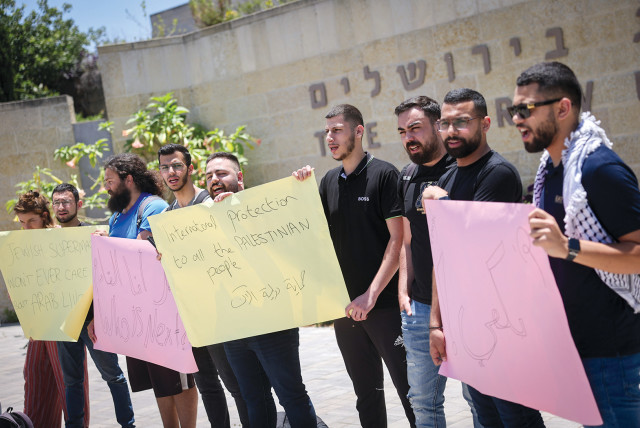Smotrich is strengthening Palestinian radicals in Jerusalem - opinion

Bezalel Smotrich lacks the ability or desire to distinguish between different parts of the Arab population. Either way, he is adamant about ignoring the experts on the subject.
Israel’s Finance Minister Bezalel Smotrich explained in a Facebook post last week why he was halting funding for pre-university programs for Arab students from east Jerusalem.
He made a number of claims related to the growth of radical Islam on campus, and voiced concerns about the physical safety of Jewish students during times of security tension, as well as about the support shown by some students for Palestinian terrorism. In the post, Smotrich claimed to have met with all the relevant experts, and despite the stream of adverse comments he received on Facebook, he is not backing down.
I believe that his policy decision relies on a deeper idea. Instead of seeking pragmatic engagement based on accepted national security and economic paradigms, he wants to change the strategic paradigm that defines the relationship between Israel and the Palestinians. His desire for a paradigm shift should come as no surprise. As finance minister, he now has the power to try to implement. Tragically, instead of reducing radical forces in east Jerusalem, it may well increase them.
The Smotrich plan
Smotrich has his own plan for resolving the conflict with the Palestinians. He set this out in the Hashiloach journal in 2017. The first requirement is full annexation and Israeli sovereignty over Judea and Samaria, while at the same time denying Palestinians citizenship and voting rights. Once sovereignty is established, the Palestinians would have three options: submit to Israeli rule and give up their aspirations for a Palestinian state; evacuate Judea and Samaria, with the financial support of the Israeli government; or fight, a development which Smotrich says he would be happy with and in which Israel would employ a ferocity never seen before.
Smotrich claims his plan is based on realism and geopolitics while being “fully aligned with my religious faith, connecting between faith and realism, vision and reality” and “will end the conflict and bring true peace.” All of his policies with regard to Judea and Samaria, and in this case east Jerusalem, should be seen within the context of his plan.
The president of the Hebrew University of Jerusalem, Prof. Asher Cohen, called for the minister to reverse his decision. He committed to finding the funds himself until the program is reinstated.
Point by point rebuttal
Former rector of the university, Prof. Barak Medina, issued a point-by-point rebuttal to Smotrich. He responded that there are no extremist Islamic cells on campus; and that even during periods of heightened tension there were no security issues, and he rejected claims of student demonstrations or strikes supporting Palestinian terror or terrorists.
Intelligence Minister and Likud politician Gila Gamliel called to put an end to the budget freeze for the program. She was previously the minister responsible for the implementation of the 922 Resolution, supporting economic development for Arab society in Israel.
In response to the decision, she said: “The integration of the Arab population in academia has social, economic, and security importance.” She continued, saying that “We must continue to implement a long-term vision for the sake of reducing the gaps in society.”
Veteran Likud politician and Netanyahu appointee as head of the National Security Council, Tzachi Hanegbi, responded to Smotrich’s decision by warning of the negative security impact that eliminating the funding would have. It is rare to see members of the Likud coming out in such force in this way and on a topic of such sensitivity.
Prominent Jerusalemites with varying political and social views were all highly perturbed by the decision. In an interview with IDF Radio’s Efi Triger last week, David Koren, CEO of the Jerusalem Institute for Policy Research, with expertise in national security, education, and east Jerusalem, was crystal clear on the reasons why Smotrich’s decision damages Israeli interests.
Economic development will be damaged, he said. Access to Israeli academia for east Jerusalem Arabs is a key element of economic mobility, which – given the size of the population – is a key driver for realizing the capital’s economic potential.
Koren’s comments
As Koren comments, cutting access to higher education will only reduce the motivation of the school system in east Jerusalem to switch to the curriculum used by Israeli Arabs. The alternative to Israeli universities for east Jerusalemites is Palestinian universities, where the chances of radicalization and potential security risk are dramatically greater.
On the other hand, the human interaction between the east Jerusalem and Israeli students actually moderates their opinions, improving their perceptions of Israeli society. The radical Islamic students tend to be found within certain elements of Arab Israeli society rather than among those from east Jerusalem.
A key part of the five-year plan is also to increase the integration of Israeli syllabuses into the schools in east Jerusalem. Part of the incentive for doing so will be damaged and undermined if the Arabs from east Jerusalem can’t then gain entrance to Israeli universities.
Seemingly, Smotrich lacks the ability or desire to distinguish between different parts of the Arab population. Either way, he is adamant about ignoring the experts on the subject, and extreme ideology trumps even the best advice.
Fleur Hassan-Nahoum is a member of the Likud and deputy mayor of Jerusalem. She is a wonderful spokesperson for the city and is more or less its foreign minister. In response to the decision, she told me: “Smotrich is focusing on the wrong problem. Instead of cutting the funding for young people who have decided to integrate and normalize into life and the economy of this country, he should be losing sleep over the 85% of the schoolchildren in east Jerusalem who are learning the Palestinian Authority curriculum that teaches incitement and hatred of Israel, glorification of martyrdom. and no Hebrew.”
Rabbi Aaron Leibovitz is a community rabbi, veteran social activist in Jerusalem, and former member of the city council. “The decision of the finance minister, Bezalel Smotrich, is an unfortunate decision that is mainly motivated by competition between him and [National Security Minister Itamar] Ben-Gvir for the most extreme end of the right-wing base.”
Leibovitz also noted that one of the key advantages of the program is the number of women from east Jerusalem finding quality employment as a result. In response to Smotrich’s allegation about the program as an accelerator for Islamic extremism, he responded, “It is clear that the university has political cells, but the thought that studying at an Israeli university is what produces terrorists is a far-fetched thought in my view. The simple logic says that a higher education moderates a person.”
It is not just simple logic, but backed up by research.
Nitzan Faibish published a paper in May called “Peace and Conflict: Journal of Peace Psychology.” The paper assessed the change in attitudes of east Jerusalem students attending the Hebrew University. The conclusion was positive, and he states that the study “provides evidence that even in the context of protracted ethnopolitical conflict, spontaneous contact between individuals from different ethnic and religious groups in academic settings can result in positive perceptions of other identity groups.”
Combining voices
A local project called 0202 combines the voices of secular, Arab, and haredi Jerusalemites. CEO Noy Mordekovitch previously served in the Education Ministry, implementing the government’s five-year plan for east Jerusalem. Mordekovitch reflected on two aspects of Smotrich’s decision.
The first was that the minister’s decision was a reflection of his wider vision of the conflict with the Palestinians. Smotrich’s ultimate goal is Palestinian submission and the acceptance that there will never be a Palestinian state. Increased economic empowerment and mobility would work against that goal, and hence the logic of Smotrich’s decision.
The second and more optimistic insight was that the program of integration via academia actually works. As recently as the day before the Smotrich announcement, 0202 held a forum for Arabs from east Jerusalem to debate the relative advantages of studying in an Israeli or a Palestinian university.
The conclusion was clear. Graduates with an Israeli degree were already making meaningful career progress with a sense of belonging in Jerusalem relative to their peers; this trend is particularly pronounced in the younger demographic.
This insight is backed up by Dganit Levi from the Jerusalem Institute for Policy Research, in data published earlier this year. She found that the key motivation among school graduates in east Jerusalem to attend an Israeli university was integration into the Israeli job market and improving their Hebrew.
She noted the advantages of studying in Israeli academia as “deepening the students’ understanding of Israeli society, studying Hebrew, and an aspiration for being better prepared for the Israeli job market upon graduation.”
Levi recommended that this advantage be exploited, investing more, not less, in these specific areas.
The letter
In a letter dated August 7, 2023, addressed to the prime minister, along with the finance, education, and economy ministers, the presidents of Jerusalem’s four academic institutions appealed for a reversal of the decision.
“In the past decade, thousands of students from east Jerusalem were enrolled in preparatory programs (mechinot) in the city. Most such students are today thriving in the job market and are integrating into Israeli life. The meaning of this decision is no less than damage to Israeli society and its economy, and we will all pay for this damage for decades to come.”
Tellingly, the letter notes that it was Netanyahu and Nir Barkat, as prime minister and mayor of Jerusalem, who were the prime movers of the original initiative. Smotrich proves time and again that he marks the very edge of extreme Right politics.
There is a consensus from across the spectrum that Israel has little to gain and a lot to lose by halting the process of creating opportunities for higher education within Israeli institutions for residents of east Jerusalem. The lack of consistent investment, especially in education and academia, will allow the forces of radical Islam to tighten their grip over east Jerusalem. None of this should come as a surprise, and the government cannot be driven by one politician’s extreme ideology.
The letter to the prime minister from the capital’s academia concludes: “We call upon you, Prime Minister Netanyahu, in consideration of our shared future, not to let the voices that promote hatred and racism outweigh the understanding that an investment in higher education in east Jerusalem today will benefit us all tomorrow. Continuing this investment is no less important to the State of Israel than it is to east Jerusalem.”
I can only echo their call. ❖
The writer is a founding partner of Goldrock Capital and founder of The Institute for Jewish and Zionist Research. He is a former chair of Gesher, World Bnei Akiva, and the Coalition for Haredi Employment.
Jerusalem Post Store
`; document.getElementById("linkPremium").innerHTML = cont; var divWithLink = document.getElementById("premium-link"); if (divWithLink !== null && divWithLink !== 'undefined') { divWithLink.style.border = "solid 1px #cb0f3e"; divWithLink.style.textAlign = "center"; divWithLink.style.marginBottom = "15px"; divWithLink.style.marginTop = "15px"; divWithLink.style.width = "100%"; divWithLink.style.backgroundColor = "#122952"; divWithLink.style.color = "#ffffff"; divWithLink.style.lineHeight = "1.5"; } } (function (v, i) { });


